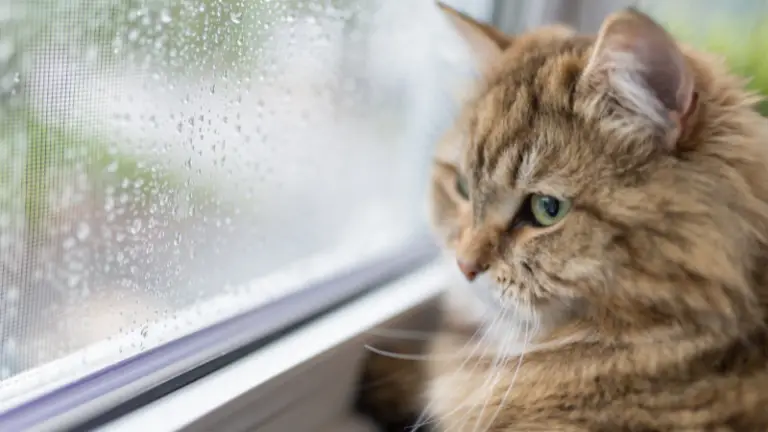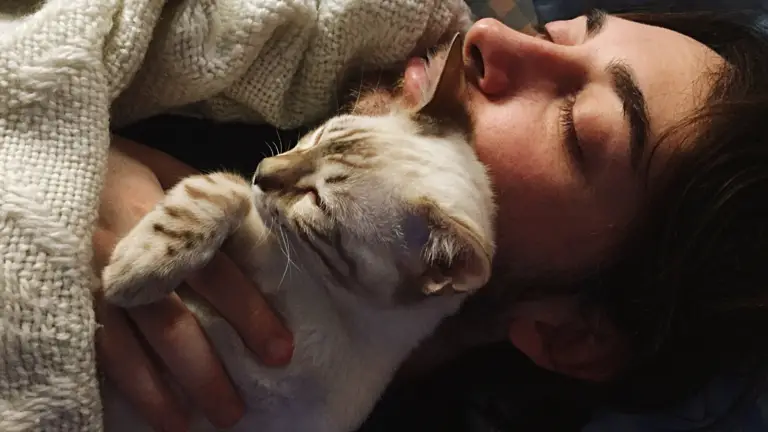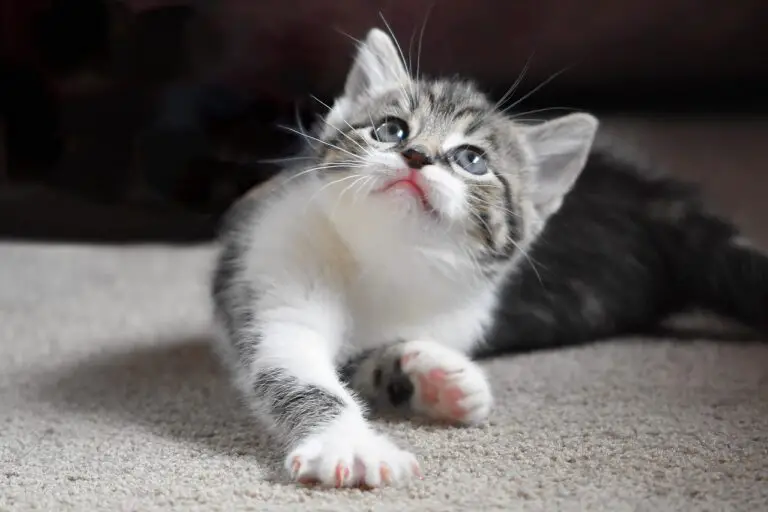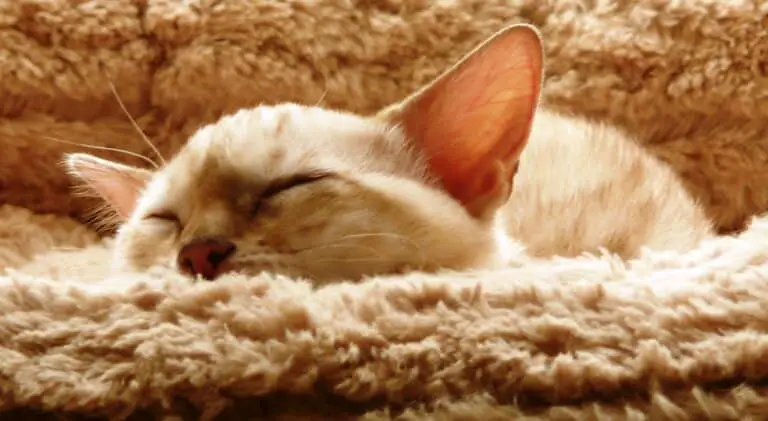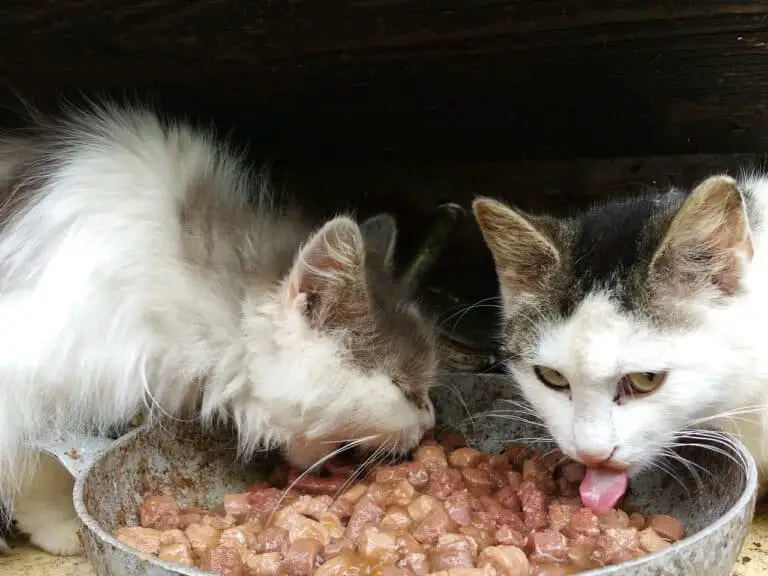MY CAT IS SNORING – 5 REASONS AND REMEDIES
My cat is snoring; should I be worried? Cats, like humans, can snore or emit sounds while asleep.
The most common reasons for a cat to snore include obstructed airways caused by obesity, respiratory infections, allergies or nasal blockage, dental issues such as tooth decay or gum disease, certain sleeping positions, and breed predisposition.
However, suppose you notice increased snoring frequency, intensity, or other signs of respiratory distress. In that case, it is best to consult a veterinarian to determine the underlying cause and provide appropriate treatment.
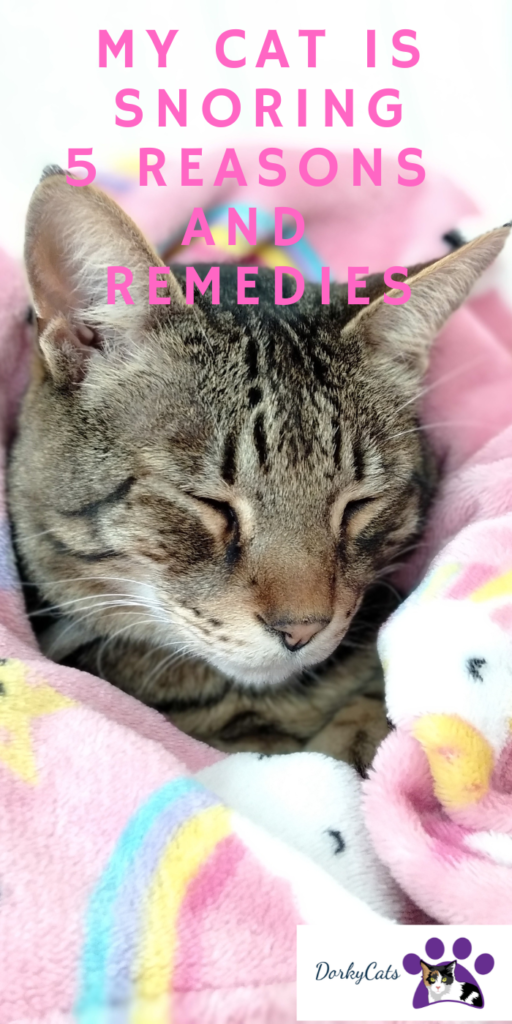
MY CAT SNORING; WHY IS THAT?
There can be several reasons why a cat snores, some benign and others that may indicate a more severe health issue. Here are some possible reasons:
1. OBESITY
Just like humans, overweight cats are more prone to snoring due to excess weight pressing on their airway passages. Therefore, if your cat is overweight, it is essential to consult a veterinarian and implement a healthy diet and exercise plan to help it lose weight.
2. RESPIRATORY INFECTIONS
Upper respiratory infections or allergies can cause inflammation in a cat’s airways, leading to snoring. If your cat is experiencing other symptoms, such as coughing, sneezing, or discharge from the eyes or nose, it is essential to consult a veterinarian.
3. BRACHYCEPHALIC CAT BREEDS
Brachycephalic is a term used to describe a specific type of facial structure in animals, particularly dogs and cats, with a short, broad head and a flat face. The term “brachy” means short, while “cephalic” refers to the head.
Brachycephalic breeds typically have flattened faces, prominent eyes, and shortened airways, which can lead to breathing difficulties and other health issues. Some examples of brachycephalic dog breeds include bulldogs, pugs, and boxers, while Persian and Himalayan cats are examples of brachycephalic cat breeds.
Certain breeds of cats, such as Persians or Himalayans, have shorter snouts and can be prone to snoring due to narrowed airways.
4. SLEEP POSITION
Just like humans, cats may snore if they sleep in certain positions that restrict their airways, such as on their backs.
5. TUMORS OR GROWTHS
Although rare, tumors or growths in a cat’s airway can cause snoring. If your cat’s snoring is persistent and does not improve with lifestyle changes or medication, it is important to consult a veterinarian for a thorough examination.
Overall, if your cat is snoring, it is vital to observe its behavior and consult with a veterinarian if you notice any other symptoms or changes in behavior. Sometimes, lifestyle changes or medication can help alleviate snoring in cats.
WHY IS MY CAT SNORING ALL OF A SUDDEN?
If your cat is snoring all of a sudden, it could be due to several reasons, including:
- Respiratory Infection: A respiratory infection, such as a cold or flu, can cause inflammation in the cat’s airways and lead to snoring.
- Allergies: Cats can also develop allergies to environmental factors such as pollen, dust, or cigarette smoke, which can cause inflammation in the airways and lead to snoring.
- Weight Gain: If your cat has gained weight suddenly, it could be a factor in the development of snoring. Extra weight can pressure the cat’s airways and lead to snoring.
- Obstruction: A foreign object stuck in the cat’s airway, such as a grass seed or a toy, can cause snoring.
- Sleeping Position: Changes in the cat’s sleeping position could also be a factor in sudden snoring. If the cat sleeps in a different position than usual, it could lead to snoring.
WHAT DOES IT MEAN IF MY CAT IS SNORING?
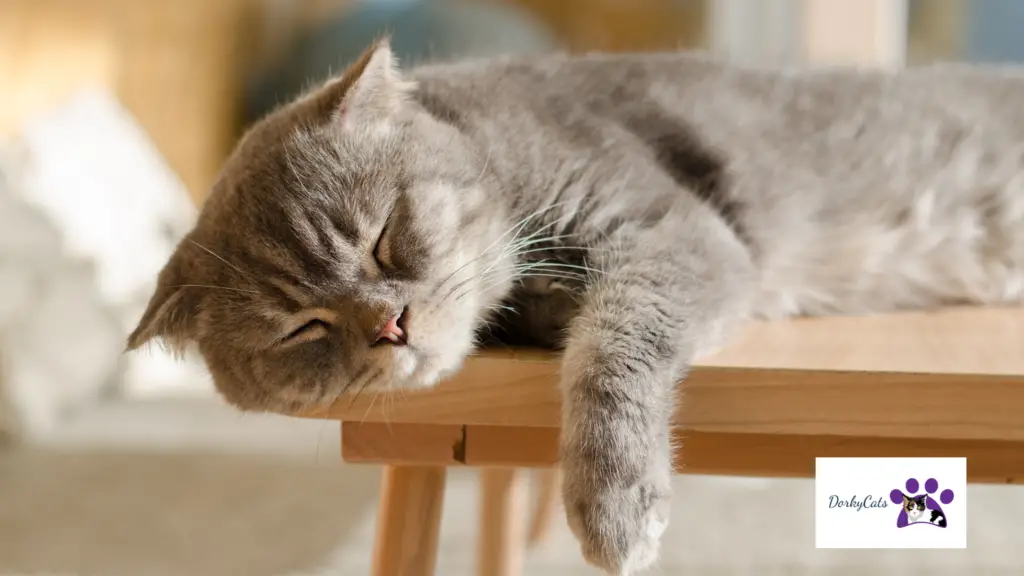
If your cat snores, it may indicate its airway is partially obstructed or inflamed. Common causes of snoring in cats include respiratory infections, allergies, obesity, dental issues, and sleeping position.
However, occasional snoring in cats is usually harmless. However, suppose your cat’s snoring becomes more frequent or severe. In that case, it could be a sign of an underlying health issue, and you should consult with a veterinarian to determine the cause and receive appropriate treatment.
WHEN TO BE CONCERNED ABOUT CATS SNORING?
You should be concerned about your cat’s snoring if you notice any of the following signs:
- Changes in Breathing: If your cat’s snoring is accompanied by wheezing, coughing, or difficulty breathing, it could be a sign of an underlying respiratory condition that requires medical attention.
- Increased Snoring: If your cat’s snoring becomes more frequent or intense, it could indicate an underlying health issue, such as obesity or respiratory infection.
- Behavioral Changes: If your cat’s snoring is accompanied by changes in behavior, such as lethargy, decreased appetite, or reluctance to exercise, it could indicate an underlying health issue.
- Sleep Apnea: If your cat stops breathing for a few seconds during sleep and then gasps for air, it could indicate sleep apnea, a severe condition that requires medical attention.
WHAT ARE THE REMEDIES FOR SNORING CATS?
The remedies for snoring cats depend on the underlying cause of the snoring. However, here are some treatments that can help alleviate snoring in cats:
- Weight Management: If your cat is overweight, weight management through diet and exercise can help alleviate snoring.
- Treatment of Underlying Conditions: If your cat’s snoring is caused by an underlying condition such as allergies or respiratory infection, treating the underlying condition can help alleviate snoring.
- Changing Sleeping Position: Changing your cat’s sleeping position can help alleviate snoring. Elevating the cat’s head by using a pillow or placing the bed on a slight incline can also help.
- Clearing Nasal Passages: Cleaning your cat’s nasal passages using saline drops or a humidifier can help alleviate snoring caused by a nasal blockage.
- Dental Care: Regular dental care, such as brushing your cat’s teeth or providing dental treats, can help alleviate snoring caused by dental issues.
Suppose your cat’s snoring persists despite trying these remedies or becomes more frequent or intense. In that case, it is best to consult a veterinarian to determine the underlying cause and receive appropriate treatment.
FREQUENTLY ASKED QUESTIONS
Why can I hear my cat breathing while sleeping?
It is normal to hear your cat breathing whare sleeping, as they tend to breathe more deeply and audibly during sleep. However, notice changes in your cat’s breathing patterns, such as wheezing, coughing, or labored breathing.
It could be a sign of an underlying health issue that requires medical attention. Sometimes, loud breathing in cats could be caused by obesity, respiratory infections, allergies, or dental problems. If you are concerned about your cat’s breathing, it is best to consult with a veterinarian to determine the underlying cause and receive appropriate treatment.
Do cats snore only when sleeping?
Yes, cats only snore when they are sleeping. During sleep, a cat’s muscles relax, and the tissues in the airway can partially obstruct the airflow, causing snoring.
What is snoring?
Snoring is a sound that occurs when the airflow is partially blocked while breathing during sleep. The vibration of the soft tissues in the throat and upper airway, including the uvula, soft palate, and tonsils, causes snoring.


